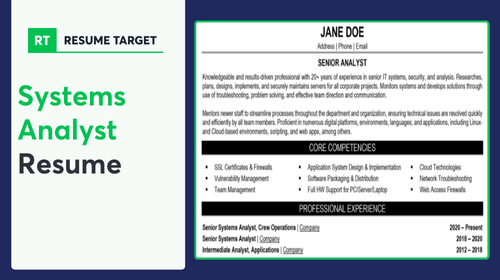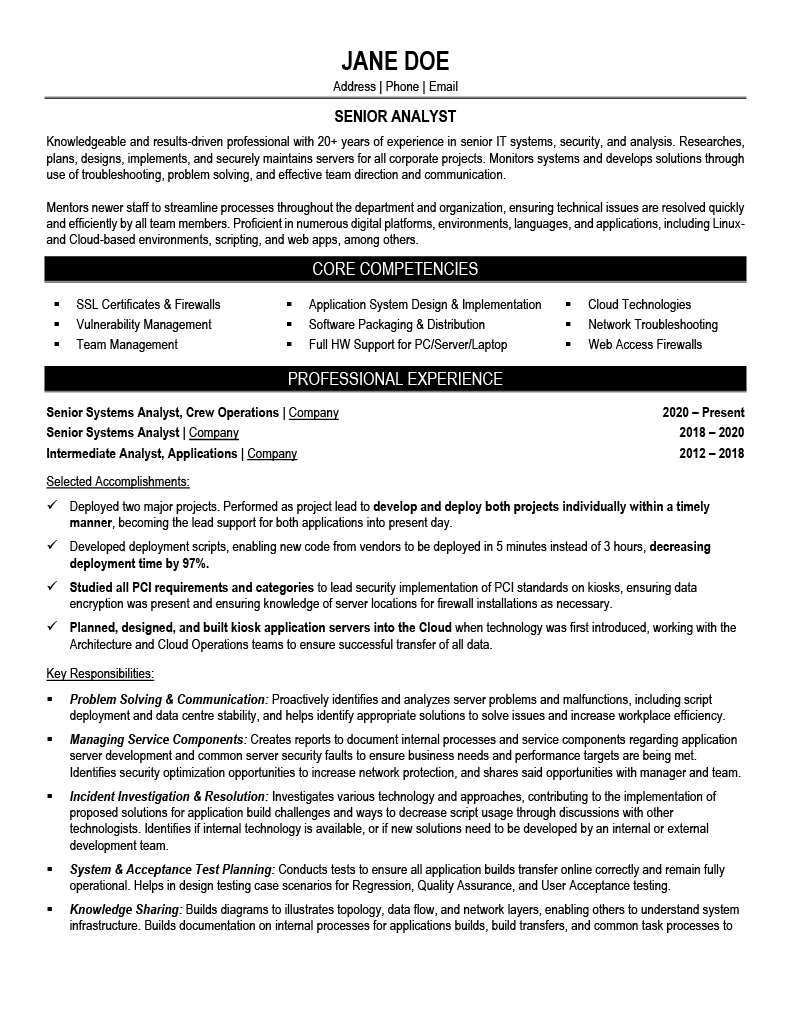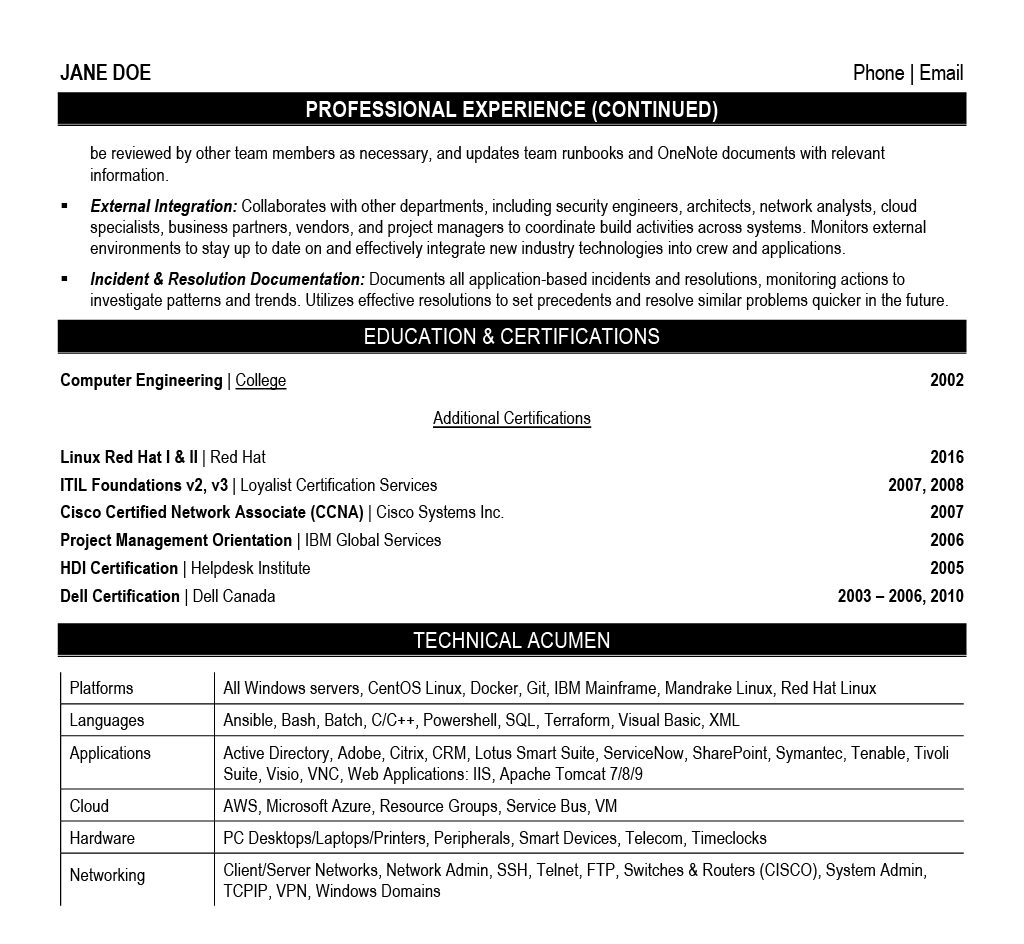

Technical skills alone won't get your resume noticed in today's competitive IT landscape. Most Systems Analysts struggle to translate complex technical achievements into business value that hiring managers understand.
Are you finding it challenging to showcase both your technical expertise and business acumen? Your resume needs to bridge the gap between IT solutions and bottom-line results that catch a recruiter's attention.
Resume Target specializes in helping Systems Analysts communicate their unique value proposition. We'll show you how to transform your technical accomplishments into compelling stories that demonstrate your impact on business operations and organizational success.


In today's digital-first business world, systems analysts serve as the crucial bridge between complex technology and business success, helping organizations achieve greater efficiency through strategic IT system improvements.
As a systems analyst, you'll wear multiple hats - consulting with managers to understand business needs, researching cutting-edge technologies, and designing improved computer systems that solve real-world organizational challenges while keeping costs in check.
Whether you're interested in working directly for a single organization or pursuing a consulting career, the systems analyst path offers exciting opportunities to combine your technical expertise with business acumen, and we'll show you exactly how to position yourself for success in this dynamic field.
Let's talk about what's exciting in the Systems Analyst field - your earning potential is impressive! As a professional who bridges the gap between business needs and technology solutions, you'll find that your expertise is highly valued across industries, especially if you specialize in areas like financial systems or engineering applications.
Figures from: U.S. Bureau of Labor Statistics
Systems Analysts can climb from entry-level positions to executive IT roles through strategic skill development and continuous learning. Your career path can lead to exciting opportunities as a Chief Technology Officer or IT Director.
To accelerate your career growth, you'll need to master both technical expertise and leadership capabilities that go beyond basic analysis skills.
- Advanced Technical Programming (SQL, Database Management) - Systems Architecture and Integration - Project Management and Documentation - Strategic Communication and Stakeholder ManagementWith a bachelor's degree in computer science or information technology and strong analytical skills, you can launch your Systems Analyst career through entry-level IT positions that build practical experience.
To advance in this field, you'll need to develop a mix of technical and soft skills, with technical proficiency being the most crucial at 18.88% of required competencies for successful Systems Analysts.
Requirements from Teal HQ
From tech hubs to financial centers, Systems Analyst roles are booming across tech, finance, and government sectors.
Figures from Goodwin Recruiting
Struggling to translate your technical expertise, project successes, and system implementations into a compelling Systems Analyst resume that catches a hiring manager's eye? This comprehensive, section-by-section guide will walk you through exactly how to showcase your technical achievements and business impact in a format that both applicant tracking systems and hiring managers will love.
If you're like most Systems Analysts, translating your technical expertise and problem-solving abilities into a compelling resume summary can feel more challenging than debugging a complex application.
While you excel at analyzing business processes and implementing technical solutions, capturing your unique blend of technical knowledge, business acumen, and communication skills in a few powerful sentences requires a strategic approach that speaks directly to what hiring managers are seeking.
How would you describe your unique blend of technical expertise and business process understanding that sets you apart from other Systems Analysts?
Reason: The Systems Analyst role bridges technical and business domains, making this combination of skills crucial for the summary. Leading with this helps establish your value proposition immediately.
What are the primary industries or types of systems you've analyzed, and how does this breadth of experience shape your approach to systems analysis?
Reason: Industry context and system diversity are key differentiators for Systems Analysts, helping readers quickly understand your scope of expertise and adaptability.
How would you characterize your role in driving digital transformation and process improvement throughout your career as a Systems Analyst?
Reason: This helps frame your career narrative around the increasingly important aspects of modernization and optimization, which are central to the Systems Analyst role in today's business environment.
As a Systems Analyst, you need to showcase both your technical expertise in systems development and your business process knowledge, making it crucial to strike the right balance between these complementary skill sets.
Your resume should highlight advanced technical abilities like requirements gathering and system architecture design, while also emphasizing day-to-day operational skills such as stakeholder communication, process mapping, and problem-solving capabilities.
Showcase your technical expertise and business impact by organizing your Systems Analyst experience into three powerful sections: a concise role overview that sets the context, measurable achievements that highlight your solutions, and core responsibilities that demonstrate your technical and analytical capabilities.
Many Systems Analysts struggle to translate their technical problem-solving abilities into clear, business-focused accomplishments that resonate with hiring managers. Your achievements must demonstrate how your systems expertise directly impacts operational efficiency, cost savings, and business process improvements through measurable metrics and tangible outcomes.
The responsibilities section demonstrates how Systems Analysts bridge the gap between technical solutions and business needs. Your role description should clearly show how you analyze, implement, and optimize systems while making complex technical concepts accessible to stakeholders across all organizational levels.
Your education and certifications demonstrate your technical expertise and commitment to staying current with systems analysis best practices. Prioritize your most relevant technical certifications and formal education that align with systems analysis, business process modeling, and enterprise architecture.
Now that you've built a strong foundation using Resume Target's proven resume writing guidelines, you're ready to transform your resume into a powerful tool for landing Systems Analyst positions.
While many job seekers only customize their cover letters, tailoring your Systems Analyst resume for each position is crucial in today's competitive tech job market.
A customized resume not only helps you bypass ATS systems by incorporating role-specific keywords, but it also demonstrates to hiring managers that your technical skills, project experience, and system optimization expertise perfectly align with their needs.
Ready to stand out from other Systems Analyst candidates? Let's turn your resume into a targeted career advancement weapon that proves you're the solution they've been searching for!
Don't let a lack of professional experience hold you back from launching your Systems Analyst career!
Your technical knowledge, relevant coursework, and hands-on projects can create a compelling story that showcases your potential to employers.
Focus on highlighting your analytical abilities, technical skills, and problem-solving capabilities in your resume.
For more detailed guidance on structuring your qualifications, check out the Student Resume Writing Guide to create a standout application.
Your resume summary is your chance to showcase how your technical education, project work, and analytical mindset make you an ideal candidate for a Systems Analyst role.
Focus on highlighting your relevant coursework, any internship experience, and your passion for solving complex technical challenges through systematic analysis.
"Detail-oriented and technically proficient Systems Analyst with hands-on experience through academic projects and internships in systems analysis and software development. Demonstrated expertise in requirements gathering, process mapping, and implementing technical solutions across multiple platforms. Skilled in SQL, Python, and various SDLC methodologies, with a track record of delivering successful project outcomes in team environments. Seeking to leverage strong analytical and problem-solving abilities to drive system optimization and efficiency improvements for a growing organization."
Now's your chance to showcase how your academic background has prepared you for success as a Systems Analyst - let your coursework and technical training shine!
Transform your educational experience into compelling content by highlighting relevant courses like "Database Management Systems"or "Business Process Analysis,"plus any capstone projects where you analyzed and improved existing systems.
1. What are the names of courses common to a degree/certification for Systems Analysts? - Extracted information: Common courses include Fundamentals of Cybersecurity, Relational Database Management, Fundamentals of Software Development and Programming, Introduction to SQL, Network Communications with TCP/IP, and Java Programming I [2]. - Source URL: [2]Relevant Coursework: Fundamentals of Cybersecurity | Relational Database Management | Software Development and Programming | Introduction to SQL | Network Communications with TCP/IP | Java Programming I
Key Projects:
Enterprise Resource Planning System Migration: Led a comprehensive analysis of legacy system requirements and designed migration strategy for new ERP implementation.
Healthcare Management System Integration: Collaborated with cross-functional team to analyze and implement integration between multiple healthcare information systems.
Leverage your academic training, technical certifications, and hands-on project experience to create a compelling skills section that showcases your readiness to tackle complex system challenges and deliver innovative solutions.
As an entry-level Systems Analyst, your combination of technical knowledge and analytical capabilities positions you well for a career field that continues to grow with increasing demand for digital transformation and system optimization expertise.
Let's face it - translating your complex technical achievements into business-friendly language that both IT managers and non-technical executives can understand feels like trying to speak three languages at once.
At Resume Target, we specialize in crafting technology resumes that bridge the technical-business gap, helping systems analysts like you showcase both their technical expertise and business impact.
Our proven track record includes helping hundreds of systems analysts land roles at leading tech companies by highlighting their unique ability to analyze, implement, and optimize mission-critical systems.
With companies accelerating their digital transformation initiatives, now is the perfect time to upgrade your resume to match your true potential - let's get started with a free consultation today.